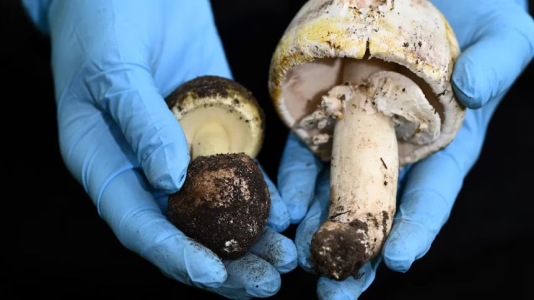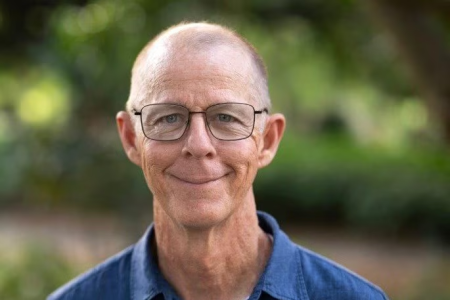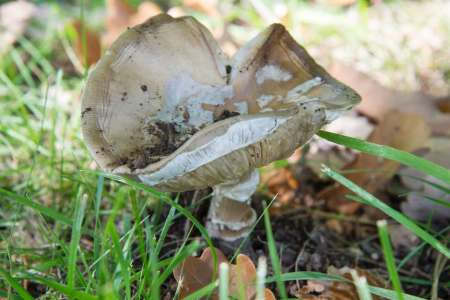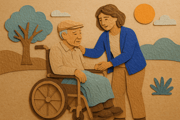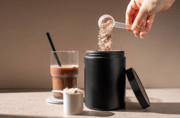Spread of death cap mushrooms sparks health warning in NSW
By
ABC News
- Replies 0
People in New South Wales are being warned against eating wild mushrooms following the spread of death cap mushrooms in the state.
NSW Health and local councils have detected the poisonous fungi spreading in Sydney, the Southern Highlands and southern NSW.
It follows two years of surveillance by the health department and councils after an initial detection of the mushrooms in the state's south.
Death cap mushrooms, also known as Amanita phalloides, can be fatal if consumed.
Brett Summerell, chief scientist at the Botanic Gardens of Sydney, said the rise could be attributed to a spread in where they are being found and "particularly good rainfall" helping growth conditions.
"I certainly think that people are more interested in foraging for wild mushrooms," Dr Summerell said.
"That results in people heading out into the bush or into paddocks or whatever, thinking they know what they're getting and not really knowing what they're getting."
Last year, 23 people were hospitalised for eating mushrooms.
Two of these hospitalisations were children under the age of five.
The NSW Poisons Information Centre also responded to 363 calls for exposures to wild mushrooms in NSW and ACT that same year.
This was an increase of 26 per cent compared to 2023.
There have been 190 calls so far in 2025.
"Symptoms of mushroom poisoning can sometimes be delayed, but early treatment is vital to health outcomes," she said.
Consumption of the fungi can lead to vomiting and diarrhoea. In severe cases, eating the mushrooms could result in liver, kidney damage or death.
Ms Adamo recommended parents with young children remove any wild mushrooms growing in their yard.
Dr Summerell urged people to not forage or eat wild mushrooms because it was "quite difficult" to tell the "good ones from the bad ones".
He said cooking poisonous mushrooms also did not make them safe to consume.
"The best thing to do unless they're somebody who really is an expert on these things is to not forage in the wild and to get their mushrooms from a store bought location," he said.
Dr Summerell does not believe foraging is likely linked to cost-of-living concerns due to the locations being difficult to get to and high transport costs to get there.
"I think it is more likely people have an interest … thinking they're going to get something exotic and particular — flavours and tastes that they're unlikely to get [elsewhere]," he said.
"The level of interest has increased both for good and bad reasons, and people are wanting to have these experiences.
"Which if it works out is fine, but if you pick the wrong thing it's definitely not going to be the case."
By Jesse Hyland
NSW Health and local councils have detected the poisonous fungi spreading in Sydney, the Southern Highlands and southern NSW.
It follows two years of surveillance by the health department and councils after an initial detection of the mushrooms in the state's south.
Death cap mushrooms, also known as Amanita phalloides, can be fatal if consumed.
Brett Summerell, chief scientist at the Botanic Gardens of Sydney, said the rise could be attributed to a spread in where they are being found and "particularly good rainfall" helping growth conditions.
"I certainly think that people are more interested in foraging for wild mushrooms," Dr Summerell said.
"That results in people heading out into the bush or into paddocks or whatever, thinking they know what they're getting and not really knowing what they're getting."
Last year, 23 people were hospitalised for eating mushrooms.
Two of these hospitalisations were children under the age of five.
The NSW Poisons Information Centre also responded to 363 calls for exposures to wild mushrooms in NSW and ACT that same year.
This was an increase of 26 per cent compared to 2023.
There have been 190 calls so far in 2025.
Early treatment 'vital' if consumed
Genevieve Adamo, a senior specialist in poisons information at the NSW Poisons Information Centre, said death cap mushrooms can be lethal."Symptoms of mushroom poisoning can sometimes be delayed, but early treatment is vital to health outcomes," she said.
Consumption of the fungi can lead to vomiting and diarrhoea. In severe cases, eating the mushrooms could result in liver, kidney damage or death.
Ms Adamo recommended parents with young children remove any wild mushrooms growing in their yard.
Dr Summerell urged people to not forage or eat wild mushrooms because it was "quite difficult" to tell the "good ones from the bad ones".
"The best thing to do unless they're somebody who really is an expert on these things is to not forage in the wild and to get their mushrooms from a store bought location," he said.
Dr Summerell does not believe foraging is likely linked to cost-of-living concerns due to the locations being difficult to get to and high transport costs to get there.
"I think it is more likely people have an interest … thinking they're going to get something exotic and particular — flavours and tastes that they're unlikely to get [elsewhere]," he said.
"The level of interest has increased both for good and bad reasons, and people are wanting to have these experiences.
"Which if it works out is fine, but if you pick the wrong thing it's definitely not going to be the case."
By Jesse Hyland

